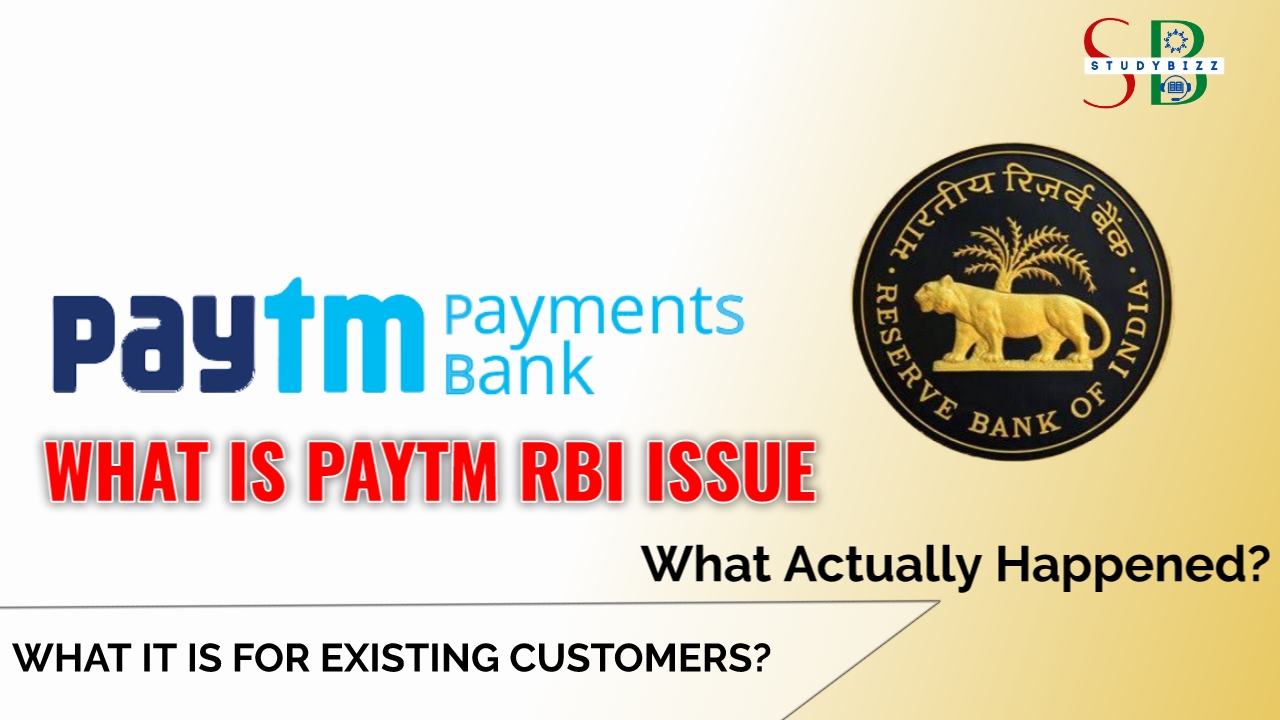Paytm RBI Issue or Paytm crisis is in the news for the last few days. It is known that the Reserve Bank of India (RBI) has imposed restrictions on Paytm Payments Bank Limited (PPBL) for not accepting deposits from customers.
- Paytm Payments Bank will not be able to accept any deposits after February 29, 2024.
- Credit transactions or top-ups in customer accounts, prepaid instruments, wallets, FASTags, National Common Mobility (NCMC) cards, etc. shall not be done from March 01, 2024.
- For Existing Customers: Paytm In an email and text message to its customers, said that the RBI directive does not impact their existing balances.
- Only new deposits and additions not allowed after 29th February 2024 However, there is no restriction on withdrawal of money from your existing balance even after Feb 29, 2024
RBI has taken the decision to put above restrictions based on the report given by external auditors on the activities of PPBL. The RBI has revealed that the company has violated some norms and due to the fact that the audit has revealed that there are monitoring deficiencies, further monitoring measures have to be taken against the company.
Paytm Share falls by 70% so far: Shares of its parent company One97 Communications (Paytm) have lost 40% in the initial two trading days (Thursday and Friday) in the wake of RBI restrictions on PPBL. It settled at Rs.487.05 with a loss of 20 percent on Friday. The market value of the company lost Rs. 17,378.41 crores in 2 days and was limited to Rs. 30,931.59 crores. Paytm went public in 2021 at an issue price of Rs 2,150 per share of Rs 1 face value. Collected Rs.18,300 crores. Of this, Rs.8,300 crore was raised through the issue of fresh shares and Rs.10,000 crore through Offer for Sale (OFS). On November 18, it was recorded at Rs.1,950 in NSE and Rs.1,955 in BSE. It recorded a low of Rs.1,560 on the same day. It is noteworthy that the share has lost about 77 percent so far.
Difficulties in the beginning: Paytm was launched in 2009 by Vijay Shekhar Sharma. He ran the company facing many difficulties in the beginning. Paytm was in the news after collecting investments from the Alibaba group and Softbank. In 2016, Prime Minister Modi’s demonetisation of large notes went down well with Paytm. More people switched to digital payments and used Paytm. With this, Vijay then joined the club of 100 rich people in the country. It was also a topic of discussion at that time to openly criticize companies like Google for their activities to harm small seed companies. Vijay holds 51 percent stake in Paytm Payments Bank, while the rest is held by One97 Communications Limited.
Recently, Vijay responded on X in the backdrop of RBI restrictions. “Every challenge has a solution. We will always be loyal to the country.” He said
What had actually happened at Paytm
Key issues have come to light pertaining to RBI restrictions on Paytm Payments Bank. Money laundering allegations and KYC violations seem to be the background for this. It is reported that fraudulent transactions worth crores of rupees have taken place between Paytm Wallet and Payments Bank. If necessary, RBI is ready to pull Enforcement Directorate (ED) to investigate futther.
In relation to Paytm Payments Bank, lakhs of accounts have been identified for which KYC has not been done. Cases of opening thousands of accounts with a single PAN have come to light. It is known that sometimes the transactions in the accounts exceeded the maximum limit prescribed for the KYC accounts. Paytm Payments Bank has 35 crore e-wallets, of which 31 crore accounts are dormant. The remaining 4 crore accounts also have zero balances and small amounts. There are suspicions that dormant accounts may be used for money laundering.
Rules are the same for all companies
“Each organization has its own regulatory body in that sector to regulate it. RBI’s reason for taking action is that regulations have been violated in Paytm in the financial sector. PPBL, which continues to be a fintech company, cannot escape the supervision of the regulatory body” said Union Minister of State for Electronics, Information and Technology Rajeev Chandrasekhar.
“We are ready to provide services to Paytm users in the wake of the RBI order to Paytm Payments Bank to stop almost all operations from March 1. If RBI cancels Paytm Payments Bank license, we have no plan to go directly to save Paytm. As RBI issues guidelines to us, we will be there if there is any impact.” – Said SBI Chairman Dinesh Kumar





Leave a Reply